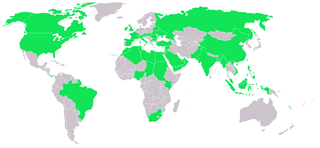
The Oil-for-Food Programme (OIP) was established by the United Nations in 1995 to allow Iraq to sell oil on the world market in exchange for food, medicine, and other humanitarian needs for ordinary Iraqi citizens without allowing Iraq to boost its military capabilities.
Benon Vahe Sevan was the head of the United Nations' Oil-for-Food Programme, established in 1996 and charged with preventing Iraq's government from using the proceeds from oil exports for anything but food, medicine and other items to benefit the civilian population.
Tongsun Park was a South Korean lobbyist. He was involved in two political money-related scandals: Koreagate scandal in the 1970s, and the Oil-for-Food Program scandal of the 2000s. Park had a reputation as the "Asian Great Gatsby".

On 6 August 1990, four days after the Iraqi invasion of Kuwait, the United Nations Security Council (UNSC) placed a comprehensive embargo on Iraq. The sanctions stayed largely in force until 22 May 2003, and persisted in part, including reparations to Kuwait. The original stated purposes of the sanctions were to compel Iraq to withdraw from Kuwait, to pay reparations, and to disclose and eliminate any weapons of mass destruction (WMD).
Imvume Holdings is a South African oil company. In 2005 it was involved in what the South African press dubbed the Oilgate scandal.
Oilgate is a South African political scandal in which the petrol company Imvume Holdings was accused of paying R11 millions of state money to the ruling African National Congress shortly before the 2004 General Election. The money had been received from the state oil company, PetroSA, as part of an advance payment for a quantity of oil condensate that had been procured from Glencore, an international company.
AWB Limited was a major grain marketing organisation based in Australia. Founded in 1939 by the Government of Australia as the Australian Wheat Board, in 1999 it became a private company, owned by wheat growers. It was acquired by Agrium in 2010.
Andrew Alexander Lindberg is an Australian businessman.
The Cole Inquiry, formally the Inquiry into certain Australian companies in relation to the UN Oil-For-Food Programme, was a Royal Commission established by the Australian government pursuant to the Royal Commissions Act 1902 to investigate "whether decisions, actions, conduct or payments by Australian companies mentioned in the Volcker Inquiry into the United Nations Oil-for-Food Programme breached any Federal, State or Territory law."
Terence Rhoderic Hudson Cole,, is an Australian jurist, known best for presiding over two Australian Government Royal Commissions.
Caroline Overington is an Australian journalist and author. Overington has written 13 books. She has twice won the Walkley Award for investigative journalism, as well as winning the Sir Keith Murdoch prize for journalism (2007), the Blake Dawson Waldron Prize (2008) and the Davitt Award for Crime Writing (2015).

Ruth Elizabeth Russell is an Australian peace activist, and one of five Australian citizens who travelled to Iraq in 2003 to function as a human shield, and for some of the eight weeks was located at the Taji food silo. Her stated reason for doing so was to show "solidarity with the Iraqi civilians who will suffer greatly from the planned invasion of Iraq".
Trevor James Flugge is an Australian farmer and businessman. He is best known as a former official of the Australian Wheat Board (AWB). He joined the board in 1984, was chair of AWB in 1995–2002, and was present at meetings in Iraq which were linked to the Oil-for-Food scandal, and an inquiry by the United Nations.
Oscar Sherman Wyatt Jr. is an American businessman and self made millionaire. He was the founder of Coastal Corporation and a decorated bomber pilot in World War II. In 2007 the U.S. federal court in Manhattan tried him for illegally sending payments to Iraq under the Oil-for-Food Program.

Paul Thomas O'Sullivan, is an Australian diplomat and public servant who served as Australia's High Commissioner to New Zealand and as former Director-General of Security. O'Sullivan accepted a role as a political advisor for the Abbott government in 2013.
The Wheat Export Authority (WEA) was established 1 July 1999 as part of restructuring the former government-owned Australian Wheat Board in preparation for its sale as AWB Limited. It was felt that a number of the tasks carried out by the previous Australian Wheat Board would not be appropriate for a privately owned body; thus, the WEA was established. The WEA's role was determined by the Wheat Marketing Act 1989 and its operations were funded by a charge on Australian wheat exports.
The Oil-for-Food Program Hearings were held by the U.S Senate Permanent Subcommittee on Investigations beginning in 2004 to investigate abuses of the United Nations (UN) Oil-for-Food Programme in which the economically sanctioned country of Iraq was intended to be able to sell limited amounts of oil in exchange for vital food and medicine for its population.

United Nations Security Council resolution 1538, adopted unanimously on 21 April 2004, after expressing concern about the administration and management of the Oil-for-Food Programme in Iraq, the council ordered an inquiry to investigate the matter.
The wheat industry of Australia has been organised by government regulation, by both the Commonwealth Government and state governments.

Bronte Moules is an Australian diplomat. She was Ambassador to Zimbabwe, having previously served as Deputy High Commissioner to Papua New Guinea. Moules also had responsibility for Malawi, the Democratic Republic of the Congo, the Republic of the Congo, and Zambia. She became Ambassador to Myanmar effective January 2011.






